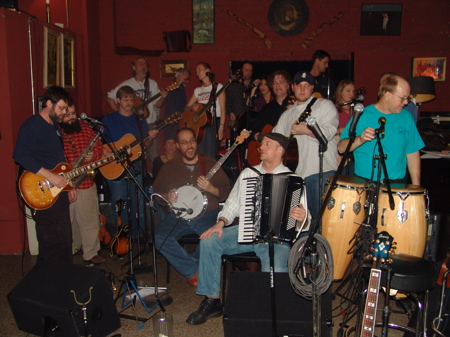This is an essay I wrote in 1995, about a year out of college. I’m resurrecting it for interest, because it definitely wreaks of blogginess, written in an era before blogs existed. And it seems like a nice way to kick off a blog.
———–
I started college as a mathematics major. The universe has an amazing shape and structure to it. The more you dig, the more sub-structure and beauty you find. I noticed that as the classes became more and more advanced, the class size shrunk and the material became more and more philosophical. The professor would pose a simple question in plain English. Then we would go back our rooms and stay up all night drawing pictures, diagrams, Greek letters. Every question revealed three new ones, a never ending expanding tree of mystery. And even if we couldn find the answers, the process itself was thrilling. So many rules, so many ways to look at things. Often, you could spend an hour examining an object, only to realize it was something common and familiar wearing a different mask! The trick was to recognize the basic patterns of the universe, hiding in different forms. And the only tools at your disposal were volumes of rules and empirical patterns, various paradigms to choose, and a drop of cleverness. The more ways you could look at something, the more connections you could reveal.
There was a certain excitement — a thrill of the hunt — in doing all this. We would come to class the next day, each of us eager to show the gems we had found in the search for treasure. And the class would always end up arguing philosophy, inevitably discussing the cleverness of the methods we used to reveal things.
There was one serious drawback, however: none of this thrill or beauty was communicable to the rest of the world. If you weren’t one of the five people in Logic 302, you were out. I was so frustrated in trying to explain to my friends what I had learned, or how wonderful or fruitful my daily hunts were. They couldn’t understand the excitement; it was all jargon to them.
Then one day I met Andre and started writing songs with him. I discovered that the most rudimentary patterns of music evoked strong emotions from everyone. What was this? How was this? What was it about music, in particular, that contained ability to immediately penetrate and command a listener’s feelings? Performing music was something special. Improvising on the piano was much more than an intellectual exercise. It was an emotional product.
We began to experiment, making songs more complicated, using different patterns. And we began to equate musical patterns with feelings. For example, it doesn’t matter how depressing a song is — if I suddenly play a tonic six-four inversion chord, people will breathe a sigh of relief. The cavalry has arrived. I began to feel like a kid with a chemistry set: “I mix this and this and this and this, then we can evoke emotion X from anyone.” I became fascinated with this. What an incredible power to have! To be able to evoke any emotion from anybody this is an amazing form of communication. Here was that missing part of being a mathematician: the ability to let people know how I feel. Now I could.
Of course, it didn’t always work out so smoothly. If the patterns were mixed in raw form, the music sounded corny or generic, and didn’t seem to effect anybody at all. There had to be something more clever, more disguised in the way songs were assembled.
That’s when I realized that there is a basic tension between following the rules and breaking them. As Bernstein told Sondheim (who told me at a brief dinner!), “every note must be fresh yet inevitable.” Inevitable: the rules must be followed or the music will sound random, and the listener’s ear will be unsatisfied. Fresh: the rule-following must be obscured — cleverly or artistically done so it sounds like brand new ear-pleasing patterns are being invented.
That is the ultimate challenge: to find the perfect compromise. Music composition is to create wondrous and pleasing patterns that sound thrilling and new, when in reality they are the same old dish served up in a new way. Hunting down this compromise is perhaps the hardest game of all, what keeps me constantly passionate and fascinated. It’s the best of both the math and the music worlds. Composition, for me, always begins as that great math problem. First decide what you need to communicate; then search the rules, let your mind race to look at things in different ways, analyze, dissect, then carefully assemble a solution that works, being as clever and roundabout with the rules as you can be. At the same time, however, it has a tangible result: something artistic, emotional, communicative, powerful. Your final solution becomes a world into itself, no longer dissectable, and able to instantly penetrate the heart and mind of a listener, directly conveying your ideas and feelings. It’s a perfect combination of the math problem’s thrilling process and music-performing’s thrilling product.
